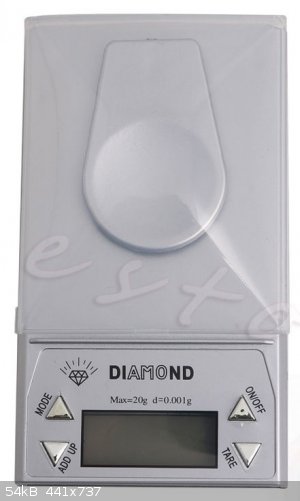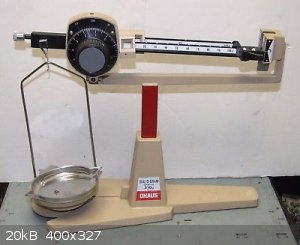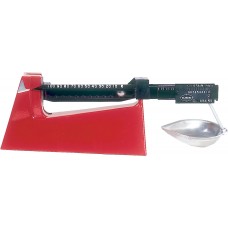Gargamel
Hazard to Others
  
Posts: 166
Registered: 9-3-2013
Member Is Offline
Mood: No Mood
|
|
Some advice on 20g range scales needed
Perhaps you can give me some advice or even suggest something.
To make it short, I'm looking for a proper scale to measure out very small amounts, not overstraining my limited budget (A contradiction, I know...).
Im just a guy that does some small scale experimentation at home, A "real" lab scale is out of question. Lets just say I'd like to spend 100€ or so.
A typical task would be 100mg with an accuracy of 10%.
Do you think that is a feasible task for that money?
There are many scales with 0,001g read-out on the market, but usually the vendors give little information about accuracy.
Im looking for something like so-and-so much percent + so-and-so much digits - in vain.
Two things that are also important for me:
No auto power off! At least not within 2 or better 5 minutes or so.
And ideally, the scale should be able to dose something. You know, one crumble, another one, another one...
And the scale wont move, because it tries to stabilize its zero position...
-> the measurement is ruined.
|
|
|
yobbo II
National Hazard
   
Posts: 709
Registered: 28-3-2016
Member Is Offline
Mood: No Mood
|
|
...."And ideally, the scale should be able to dose something. You know, one crumble, another one, another one.."...
No, I don't know!
Yob
|
|
|
wg48
National Hazard
   
Posts: 821
Registered: 21-11-2015
Member Is Offline
Mood: No Mood
|
|
Its frustrating that most scales do not specify the absolute accuracy even if the cost is more than £100. I am ignoring the ads that claim the
resolution is the accuracy.
Have thought about it, it probably because g can change by about 0.1% from place to place. So its expected that the scales will be calibrated with a
know mass so the reproducibility and linearity are specified only.
If your only after 10% at 30g (that’s+/-3g) accuracy its probably hard to find electronic scales that are not that accurate provided the resolution
is at least 0.03g and the cost will be a lot less that 100euro. Sooner or later you will want to measure something in a flask or beaker so I suggest
to go for a max of say 250g with a resolution of at least 0.1g and even a resolution of 10mg will cost you less than 100euro.
If your still worried about accuracy you can purchase calibration weights for about £12 with a claimed accuracy of +/-10mg (if you believe it) from
ebay. Unbelievable I found most ads for calibration weights did not specify the accuracy, how crazy is that.
However the UK Mint quotes the masses of British coins to two decimal places so new coins can be used as calibration weights with about +/-10mg
accuracy.
I have scales that auto turn off in few minutes. Yes super irritating when you have tared the beaker mass and did not write the mass down.
One more point some scales claim the resolution is the least significant bit of the display but in use they change by more than one count probably due
to the limited resolution of the calibration calculation so get more resolution than you need.
[Edited on 1-5-2018 by wg48]
|
|
|
JJay
International Hazard
    
Posts: 3440
Registered: 15-10-2015
Member Is Offline
|
|
I have one of these: https://www.amazon.com/American-Weigh-GEMINI-20-Portable-Mil...
I haven't tested it with a wide range of reference weights, but it seems to usually weigh within about 0.5%.
|
|
|
Reboot
Hazard to Others
  
Posts: 141
Registered: 8-8-2017
Member Is Offline
Mood: No Mood
|
|
| Quote: | | A typical task would be 100mg with an accuracy of 10%. |
Indeed?
Well, giving the question the benefit of the doubt, these guys seem like a decent value:
https://ussolid.com/catalog/category/view/s/scales-and-balan...
I doubt they're on the level of a 'name brand' lab milligram scale, but they're also a tenth the price. Proper lab scales have power cords; you
couldn't get me to go back to a battery powered scale for love or money. Leave it on, leave it warm (and stable.)
|
|
|
sodium_stearate
Hazard to Others
  
Posts: 255
Registered: 22-4-2011
Location: guard duty at the checkpoint
Member Is Offline
Mood: No mask.
|
|
What I am looking for is a nice mechanical scale.
No batteries to worry about, no power cord.
I've scoured ebay endlessly and have seen the
typical O'Haus triple beam balance many times.
"Opportunity is missed by most people
because it is dressed in overalls and it
looks like work" T.A. Edison
|
|
|
Sulaiman
International Hazard
    
Posts: 3558
Registered: 8-2-2015
Location: 3rd rock from the sun
Member Is Offline
|
|
Quote: Originally posted by Gargamel  | Perhaps you can give me some advice or even suggest something.
To make it short, I'm looking for a proper scale to measure out very small amounts, not overstraining my limited budget (A contradiction, I know...).
Im just a guy that does some small scale experimentation at home, A "real" lab scale is out of question. Lets just say I'd like to spend 100€ or so.
There are many scales with 0,001g read-out on the market, but usually the vendors give little information about accuracy. |
I have a workmate who uses one of the cheap 20g x 0.001g scales for his firearms hobby, so this is indirect knowledge;
1) If you are formulating your own mixtures then absolute accuracy is not required as it is the ratio of weights that is important.
2) For loading you do need absolute accuracy for repeatable muzzle velocities,
so get a calibration weight
(many of the cheap digital scales come with a suitable callibration weight)
Even if your calibrated weight is not absolutely accurate it does not matter,
provided that you use the same calibration weight each time you calibrate the scales,
for consistent results.
3) I have not come across cheap digital scales that do not auto-timeout.
Periodically, a small touch to the weighing platform prevents time-out.
I suspect that no-auto-power-off would be a choice for mains powered scales only.
Not sure, but I think that my friend's scales were reliable to +/- 3mg
and looked like this

CAUTION : Hobby Chemist, not Professional or even Amateur
|
|
|
Gargamel
Hazard to Others
  
Posts: 166
Registered: 9-3-2013
Member Is Offline
Mood: No Mood
|
|
Thanks for the answers.
Yes, the realoading guys also have this problem, I already read through such shops.
| Quote: |
1) If you are formulating your own mixtures then absolute accuracy is not required as it is the ratio of weights that is important.
|
If your scale behaves linear, OK. If not...Hmm.
I really want an extra scale for small amounts, I dont care if the limit is 10, 20 or 50g...
|
|
|
Sulaiman
International Hazard
    
Posts: 3558
Registered: 8-2-2015
Location: 3rd rock from the sun
Member Is Offline
|
|
I have not done a proper investigation but based on my 300g x0.01g scales,
I have a few calibration weights and whilst 'playing;
four 100g weights have such similar weights that I cannot identify them by weight using my scales,
using 50/20/20/10/5/2/2/1g weights together with the 100g weights has led me to believe that the RELATIVE error in the chinese calibration weights is
less than the up to +/- 20mg hysteresis and randomness of my scales.
If I get a REALLY boring day I may do a more 'scientific' test,
but for now, I consider the linearity to be adequate.
==================================
even though I'm not allowed to play with energetics, so have zero experience,
I doubt that +/- 10% error is acceptable for firearms useage,
even 1% may not be quite good enough,
but you should check relevant websites because I know nuts.
CAUTION : Hobby Chemist, not Professional or even Amateur
|
|
|
JJay
International Hazard
    
Posts: 3440
Registered: 15-10-2015
Member Is Offline
|
|
I don't know many reloaders, but the ones I do know use analog scales. This scale measures grains and is low capacity, but you can probably find one
that will measure grams if you look around: https://ads.midwayusa.com/product/712103/lee-safety-magnetic...
You probably want a lab scale. They can be very expensive, but occasionally you hear about someone getting a good deal on a high-end older model.
|
|
|
Bert
Super Administrator
        
Posts: 2821
Registered: 12-3-2004
Member Is Offline
Mood: " I think we are all going to die. I think that love is an illusion. We are flawed, my darling".
|
|
Used Ohaus Dial O Gram
I have had one of these for almost 40 years now. Still works great.
.001 G resolution, quick to use, much more handy than sliders for fractions of a gram.
And available on eBay used or even used and refurbished for less than $100.00.

Rapopart’s Rules for critical commentary:
1. Attempt to re-express your target’s position so clearly, vividly and fairly that your target says: “Thanks, I wish I’d thought of putting it
that way.”
2. List any points of agreement (especially if they are not matters of general or widespread agreement).
3. Mention anything you have learned from your target.
4. Only then are you permitted to say so much as a word of rebuttal or criticism.
Anatol Rapoport was a Russian-born American mathematical psychologist (1911-2007).
|
|
|
JJay
International Hazard
    
Posts: 3440
Registered: 15-10-2015
Member Is Offline
|
|
I haven't used one of those since high school 
|
|
|
sodium_stearate
Hazard to Others
  
Posts: 255
Registered: 22-4-2011
Location: guard duty at the checkpoint
Member Is Offline
Mood: No mask.
|
|
I have a friend who also makes Edison brown wax
and early style cylinder records. He has an O'Haus
Dial-O-Gram scale which he brought along one time
when he visited my place.
The Dial-O-Gram scale appears to be very accurate at
its calibrated temperature of around 68 degrees F.
I demonstrated that it changes quite markedly
at a higher temperature. After doing a test with it
at an ambient temperature of around 70 degrees F. one
evening, we again tested it the next day when the
temperature had reached about 95 F. There was a quite
large variation.
I gather that this variation is due to the fact that
the "Dial-O" mechanism uses a spring. Springs
always vary their force as a function of temperature.
A plain beam balance which depends only upon
gravity will not have this variation introduced in this
particular way.
So, that's the one thing I'd be watching out for when
using the Dial-O-Gram scale. If it is always used
at a consistent temperature, it'll at least be repeatable.
"Opportunity is missed by most people
because it is dressed in overalls and it
looks like work" T.A. Edison
|
|
|
froot
Hazard to Others
  
Posts: 347
Registered: 23-10-2003
Location: South Africa
Member Is Offline
Mood: refluxed
|
|
Maybe a local jeweler can help you with one or point you in the right direction, some use incredibly accurate 20g limit scales for weighing diamonds
and gemstones.
We salute the improvement of the human genome by honoring those who remove themselves from it.
Of necessity, this honor is generally bestowed posthumously. - www.darwinawards.com |
|
|
Fulmen
International Hazard
    
Posts: 1693
Registered: 24-9-2005
Member Is Offline
Mood: Bored
|
|
I did some extensive testing of this scale: http://www.dx.com/p/precision-20g-jewelry-digital-scale-0-00...
The factory calibration was within 0,2%, and with a quality wieght I was able to get it down to 0,1%. I did multiple full-range tests over the course
of several weeks (transported it to work for tests), it was perfectly linear (to within 0,1%) throughout the range.
We're not banging rocks together here. We know how to put a man back together.
|
|
|
Bert
Super Administrator
        
Posts: 2821
Registered: 12-3-2004
Member Is Offline
Mood: " I think we are all going to die. I think that love is an illusion. We are flawed, my darling".
|
|
Quote: Originally posted by sodium_stearate  | I have a friend who also makes Edison brown wax
and early style cylinder records. He has an O'Haus
Dial-O-Gram scale which he brought along one time
when he visited my place.
The Dial-O-Gram scale appears to be very accurate at
its calibrated temperature of around 68 degrees F.
I demonstrated that it changes quite markedly
at a higher temperature. After doing a test with it
at an ambient temperature of around 70 degrees F. one
evening, we again tested it the next day when the
temperature had reached about 95 F. There was a quite
large variation.
I gather that this variation is due to the fact that
the "Dial-O" mechanism uses a spring. Springs
always vary their force as a function of temperature.
A plain beam balance which depends only upon
gravity will not have this variation introduced in this
particular way.
So, that's the one thing I'd be watching out for when
using the Dial-O-Gram scale. If it is always used
at a consistent temperature, it'll at least be repeatable. |
I have a check weight set for setting the ballance if doing anything where 1mg accuracy is critical. Especially when doing things with powder, I set
the scale for the desired weight- Over the range from 0 to about 4.5 grams where most powder charges I use are, this will sometimes require offsetting
the scale up to 2mg from the nominal setting.
Typically, reloading charges are given to the tenth of a grain. There are 64.8mg to the grain- The Dial O Gram 1mg resolution is overkill for a
reloading scale. I also have an old but still functional Dial O Grain (same scale body, but calibrated in grains), this model is no longer made and
usually costs a bit more if you can even find one.
Rapopart’s Rules for critical commentary:
1. Attempt to re-express your target’s position so clearly, vividly and fairly that your target says: “Thanks, I wish I’d thought of putting it
that way.”
2. List any points of agreement (especially if they are not matters of general or widespread agreement).
3. Mention anything you have learned from your target.
4. Only then are you permitted to say so much as a word of rebuttal or criticism.
Anatol Rapoport was a Russian-born American mathematical psychologist (1911-2007).
|
|
|
Magpie
lab constructor
    
Posts: 5939
Registered: 1-11-2003
Location: USA
Member Is Offline
Mood: Chemistry: the subtle science.
|
|
I occaisionally use a gun powder scale
The single most important condition for a successful synthesis is good mixing - Nicodem
|
|
|
Bert
Super Administrator
        
Posts: 2821
Registered: 12-3-2004
Member Is Offline
Mood: " I think we are all going to die. I think that love is an illusion. We are flawed, my darling".
|
|
$25.49 plus shipping, no batteries...
https://fsreloading.com/index.php?_route_=lee-precision-lee-...
Lee Precision safety scale. Mechanical scale, no batteries, magnetic damping, this and a check weight set will do what you ask.

Rapopart’s Rules for critical commentary:
1. Attempt to re-express your target’s position so clearly, vividly and fairly that your target says: “Thanks, I wish I’d thought of putting it
that way.”
2. List any points of agreement (especially if they are not matters of general or widespread agreement).
3. Mention anything you have learned from your target.
4. Only then are you permitted to say so much as a word of rebuttal or criticism.
Anatol Rapoport was a Russian-born American mathematical psychologist (1911-2007).
|
|
|